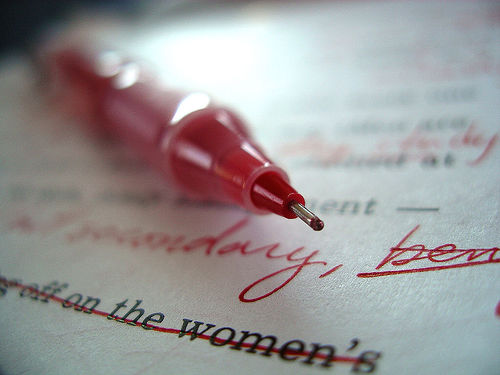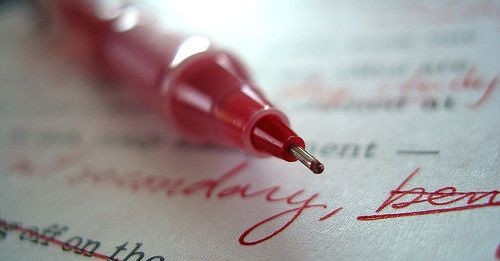The editing process can be harrowing and to a writer it can feel like every movement of the Red Pen is a cut against your own heart. However, Blake Morrison makes an astute observation:
Editing might be a bloody trade.
But knives aren’t the exclusive property of butchers.
Surgeons use them too.
Editing can be a bloody trade indeed. Tears can be shed and the lives of commas lost, but there is an art to editing. A good editor is a surgeon – they remove the problems with a skilful slice, leave the arteries intact and ensure vital organs remain functioning and, in the best case scenario, function better when the editing is done.

Image: http://www.elspethcooper.com
There are many articles and suggestions around the importance of editing your work and how to do this. What I am offering here is a very simplified version of editing presented in two parts.
1. The Bare Essentials
Revise punctuation. Check your use of commas and semicolons, and all the other little darlings that might make inappropriate appearances or startling disappearances – if in doubt, look up the correct use online (there are ample resources) or ask someone.
Check your spelling. Don’t be lazy when it comes to re-reading your work to check for spelling and don’t rely on spellcheck. You’re about to ask people to take the time to read your work – if you can’t be bothered doing it to check for basic errors, why do you expect others to do it for pleasure?
Double-check your paragraphs. The general rule for paragraphs is to start a new paragraph for a new topic or change in event, and to start a new paragraph when a new person speaks. Contemporary writing gives us a bit more lenience when it comes to new paragraphs and sometimes single sentences can be their own paragraph. Don’t overdo it and do ensure your new paragraphs are deserving of the new line.
2. Essential Style
Regardless of how well you’ve used apostrophes of possession, if your writing style is inconsistent or the content lacks quality, no amount of grammatical revision will save you. Ask yourself the following questions:
What makes my story interesting? Is it the unusual plot or fascinating characters? How might you revise it to make it compelling?
Does it make sense? Are the plot and characters plausible?
Are my characters solid? Can they exist outside of the story? Would they survive in the ‘real world’ or are they lacking in core components that make them human?
Does my writing flow? Are there missing explanations or have you over-complicated simple events?
Throughout all of this, I encourage you give your work to others to read, too. They will pick up on errors you didn’t notice and ask questions that help you re-examine your work with a fresh perspective. As writers, our work is never really finished, simply abandoned (as observed by Leonardo da Vinci). By carefully editing your work, you can at least be sure it has been abandoned with the best chances possible.
This post originally appeared on Budding Writers League and can be viewed here.

Pingback: Partying with Punctuation « dodging commas
Very good, love the analogy. But people – being human – will only learn the hard way, as I did! Distance does give perspective, anybody who has looked at a picture or better still, painted one, knows it’s a bit like mathematics in nature, i.e., integral to its use and understanding. So get out there, writers, and make those mistakes! It’s the only way.
I think a willingness to take risks and make mistakes is far more important than hiding behind a style guide … just bring out the style guide before you start submitting the final copy 😉
Great title for your post.
Haha, thanks 😉
Excellent post! All very good advice, thank you.
I’ve always tried to be open to editing, just as I’ve tried to do so for general criticism – all I ask is that it be constructive and not nit-picky as some people can be… the nice thing is that while I don’t have a creative/writers circle in town (or in general outside of those I know in the blog-world really) I have no creative minds to give feedback, but have found a handful of people who I trust to read it and give me feedback that I find does add to the story and most of them have a good enough command of the language that they often find grammatical errors while reading and I encourage them to just take a pen/pencil and mark them all out.
Feedback is very different to editing, though they often go hand-in-hand. I’m glad you’ve got people to go to for such things – it’s so important to have a community like that!
I love editing. I’m always eagar to edit my own and others work. Even though I studied as a lit major and learned how to craft my words to create a story or how to do in depth critical readings, I still love to edit more. I think its relaxing and I love to recreate a sentence to make more sense, especially when it belongs to one of my younger cousins who struggle with writing. Editing properly is a good way of teaching as long as you take them along for the proccess.
Absolutely! It can be a very rewarding experience 🙂
and a spell error creeped in … worth*
Lovely and worht keeping post. Yes, editing hurts and badly… The biggest agony is when you have to chop off your favorite sentences…
I keep versions of each stage of editing, just in case I cut out something I end up wanting to put back in there … I can’t stand to lose favourite sentences completely!
Great post. I like to leave anything [important] I write to settle for a few days, and when I look it it anew any aberrations leap off the page.Also reading it out loud always finds any soft spots 🙂
Yes, the incubation process is great when it comes to editing – helps you review things with fresh eyes! 🙂